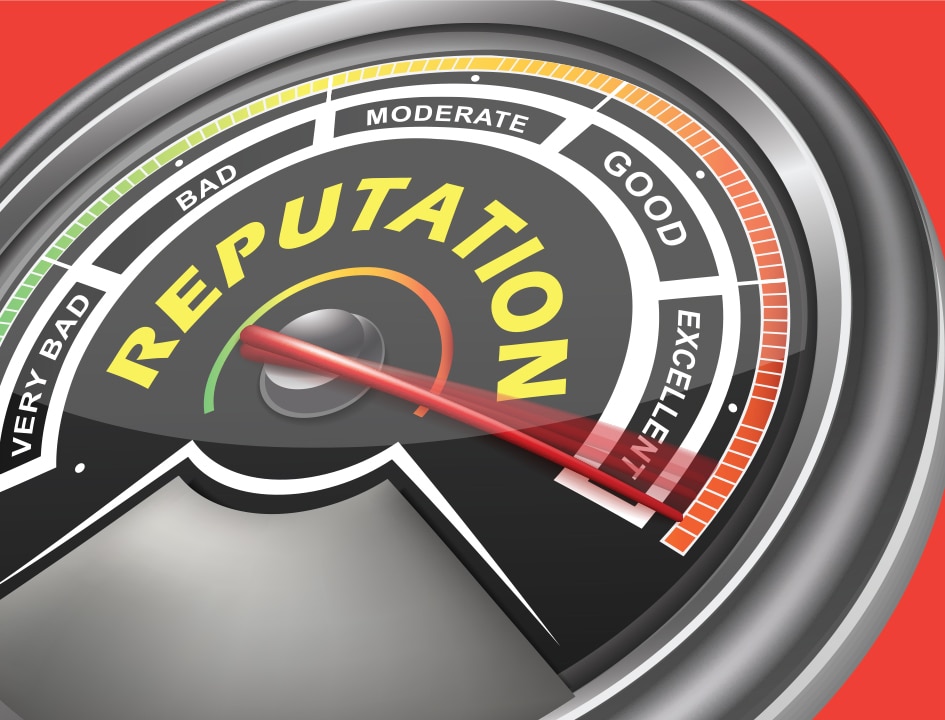Sometimes lawyers and law firms need to clean up online reputations sullied by lawsuits, bad press, negative reviews or poor social media choices. While there’s no magic bullet, reputation management is possible. There are two approaches you can take: Either hire a company to help you, or do it yourself. Here are the pros, cons and considerations.
Hired Hands
Reputation.com, which has been around since 2006, is the oldest of a growing number of services that advertise help with managing or cleaning up online reputations. These services purport to employ strategies to make positive information about you rise to the top of search results, but a few words of warning:
- They can be expensive, adding up to thousands of dollars annually.
- A few are scams — companies that will take your money and run — so be careful.
- Critics argue that they don’t provide anything above and beyond what you can easily do yourself to protect your online identity.
However, such services can be a good choice if you have plenty of money, are strapped for time or have a complicated problem that can’t be buried by other means.
Do It Yourself
With time and a bit of work, it’s possible to safeguard your online reputation on your own. Here are six tips to help if you choose to go this direction.
1. Begin monitoring. Set up a Google alert on your name, or if you have a complicated issue such as a lawsuit, consider a service such as Zignal, Klout or Brandwatch that will provide social media as well as general web monitoring.
2. Google yourself. When you get a handle on online content about yourself, you can start to change it. A typical order of appearance for top search engine results is:
- LinkedIn profile
- Company or law firm web bio
- Facebook profile
- Twitter profile
- Images of you from around the web
- Articles about you or by you
Start with the first four items on this list. The good news is that they are completely within your power to edit.
It’s especially important to keep your firm web bio/profile up to date. Google rewards pages that are recently refreshed over stagnant ones. Every time you write an article or complete a major project, make sure your bio is updated and you’ll help your page to stay high in rankings. This pushes pages with unflattering information lower in your search results.
3. Protect what you can. Pay attention to social media privacy settings, and lock down as much as you can. Then go through your personal networks and eliminate language or photos you don’t like; this ensures that inappropriate content falling outside the privacy shield won’t be visible.
4. Address negative reviews. While there are competing opinions as to whether you should claim your Avvo listing, for example, unless you do, you do not have control over content published there. However, one thing you should never do on Avvo (or any other site) is respond in anger to a negative review. Not only will this look bad to potential clients, it may get you reprimanded by your state bar. A measured response is a more appropriate choice and will often actually make you look better and more professional in your online profile.
5. Combat negative or fake news. The rise of fake news complicates communications today, and there is no one-size-fits-all approach when addressing it. While you might be able to approach a professional journalist to ask for a retraction (though only if it’s categorically wrong, and if other options, like pitching an update, are off the table), approaching a blogger intent on digging for dirt will make your situation worse. Nefarious bloggers have been known to publish and sometimes alter correspondence with their targets, so your only option in such a scenario is to try to bury them in a flood of other press.
6. Get proactive. While you can’t control everything that is written about you, you can control what you write, create or produce. Content in credentialed publications appears high in search engine results. Ensuring you have a stream of this content (bylined articles, features on pro bono work, podcast appearances, etc.) will be one of the most powerful gifts you can give your online self.
Whether you have something as serious as a malpractice suit or as simple as photos from a party you’d rather forget, know that clients are searching for you on the web. Even attorneys without reputation issues need to regularly attend to their digital identity. Monitoring your online reputation and keeping it clean are integral parts of building and sustaining your practice, and should be ongoing priorities.
Helen Bertelli is a marketer and entrepreneur, having helped to build two PR startups as well as founding the marketing department for a national law firm and her own digital publishing company. She is now Vice President with Infinite Global, an international communications and public relations firm serving the legal industry. Follow her on Twitter @HelenBertelli3.
GET THE GUIDE!
This article is from Attorney at Work’s new 80-page ezine, “Engage! A Lawyer’s Guide to Social Media Marketing.“ There’s great advice on using LinkedIn, Twitter, Facebook and much more inside, so be sure to download your copy.
Illustration ©iStockPhoto.com
Get “One Really Good Idea Every Day”
Subscribe to the Daily Dispatch and the Weekly Wrap (same price: free). Follow us on LinkedIn, Facebook and Twitter @attnyatwork.

















